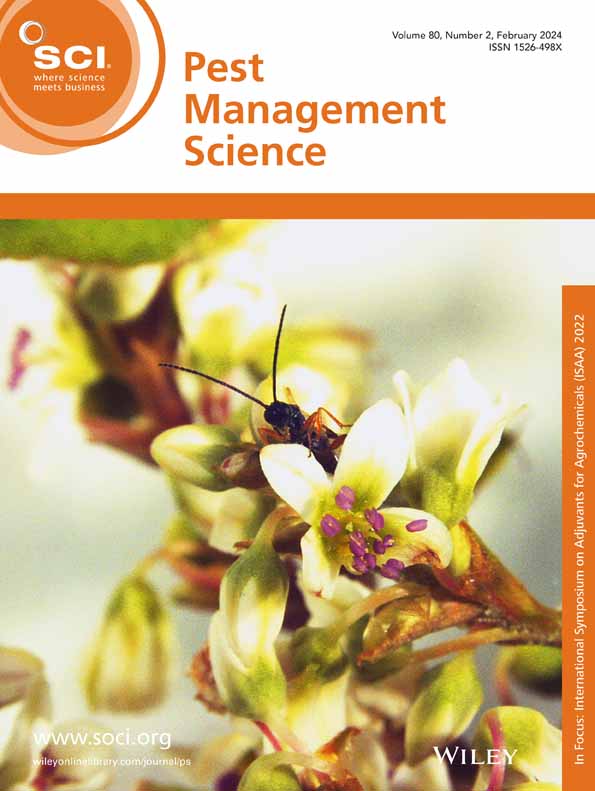Effects of lithium chloride on queen egg-laying performance and worker honey bee behavior.
IF 3.8
1区 农林科学
Q1 AGRONOMY
引用次数: 0
Abstract
BACKGROUND Lithium chloride (LiCl) has recently emerged as a potential treatment for Varroa in honey bee colonies, yet its effects on bee behavior remain poorly understood. This study investigates, for the first time, the impact of oral exposure to chronic 50 mM LiCl-administered via candy over 7-10 days-on three key behavioral traits: queen oviposition, worker brood care, and worker aggression. Laboratory assays were conducted using caged bees with ad libitum access to LiCl-enriched or control candy. RESULTS Egg-laying rates did not differ significantly between LiCl-treated and control groups. Worker bees exposed to LiCl showed a significant increase in mite mortality. Brood care behavior, assessed using a 4-day-old queen larva, was unaffected in terms of nursing frequency and duration. However, LiCl-treated workers exhibited a significant reduction in aggressive behaviors compared to controls. CONCLUSIONS LiCl did not adversely influence queen egg laying or workers' nursing behavior, reinforcing previous findings suggesting negligible long-term risks to essential colony maintenance activities such as queen reproductive performance and nursing behavior. The reduced aggression observation is consistent with reports from other species, suggesting a conserved modulatory role of Li on aggression across the animal kingdom. From an applied perspective, these results imply that LiCl can be used as Varroa control without compromise on colony reproduction and brood care. Furthermore, LiCl could potentially facilitate the management of aggressive colonies, thereby reducing stress for both the bees and their handlers. © 2025 The Author(s). Pest Management Science published by John Wiley & Sons Ltd on behalf of Society of Chemical Industry.氯化锂对蜂后产蛋性能及工蜂行为的影响。
背景氯化锂(LiCl)最近被认为是一种潜在的治疗蜂群瓦螨的方法,但它对蜜蜂行为的影响仍然知之甚少。本研究首次调查了通过糖果口服暴露于慢性50毫米氯化锂超过7-10天对三个关键行为特征的影响:蚁后产卵、工蜂幼崽护理和工蜂攻击。实验室分析是用笼子里的蜜蜂进行的,它们可以自由地获得富含licl的糖或对照糖。结果lcl处理组与对照组产蛋率无显著差异。暴露于LiCl的工蜂的螨死亡率显著增加。使用4天大的蜂王幼虫评估的育雏行为在护理频率和持续时间方面不受影响。然而,与对照组相比,licl治疗的工人表现出明显减少的攻击行为。结论slicl不会对蜂王产卵或工蜂的护理行为产生不利影响,这进一步证实了之前的研究结果,即对蜂王繁殖性能和护理行为等基本群体维持活动的长期风险可以忽略不计。攻击减少的观察结果与其他物种的报告一致,表明Li在动物界对攻击的保守调节作用。从应用的角度来看,这些结果表明LiCl可以在不影响群体繁殖和育雏的情况下作为瓦螨的防治手段。此外,LiCl可以潜在地促进侵略性殖民地的管理,从而减少蜜蜂和它们的处理者的压力。©2025作者。由John Wiley & Sons Ltd代表化学工业协会出版的《害虫管理科学》。
本文章由计算机程序翻译,如有差异,请以英文原文为准。
求助全文
约1分钟内获得全文
求助全文
来源期刊

Pest Management Science
农林科学-昆虫学
CiteScore
7.90
自引率
9.80%
发文量
553
审稿时长
4.8 months
期刊介绍:
Pest Management Science is the international journal of research and development in crop protection and pest control. Since its launch in 1970, the journal has become the premier forum for papers on the discovery, application, and impact on the environment of products and strategies designed for pest management.
Published for SCI by John Wiley & Sons Ltd.
 求助内容:
求助内容: 应助结果提醒方式:
应助结果提醒方式:


